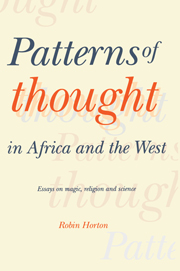Book contents
- Frontmatter
- Contents
- Acknowledgements
- Introduction
- BEGINNINGS
- MAINLY CRITICAL
- 2 Neo-Tylorianism: sound sense or sinister prejudice?
- 3 Lévy-Bruhl, Durkheim and the Scientific Revolution
- 4 Back to Frazer?
- 5 Professor Winch on safari
- 6 Judaeo-Christian spectacles: boon or bane to the study of African religions?
- MAINLY CONSTRUCTIVE
- Postscript
- Notes
- Bibliography
- Index
5 - Professor Winch on safari
Published online by Cambridge University Press: 05 June 2012
- Frontmatter
- Contents
- Acknowledgements
- Introduction
- BEGINNINGS
- MAINLY CRITICAL
- 2 Neo-Tylorianism: sound sense or sinister prejudice?
- 3 Lévy-Bruhl, Durkheim and the Scientific Revolution
- 4 Back to Frazer?
- 5 Professor Winch on safari
- 6 Judaeo-Christian spectacles: boon or bane to the study of African religions?
- MAINLY CONSTRUCTIVE
- Postscript
- Notes
- Bibliography
- Index
Summary
One of the most widely cited of recent writings on the borderland of philosophy and anthropology is Peter Winch's ‘Understanding a Primitive Society’ (referred to hereafter as UPS). The main reason for the breadth of its appeal would seem to be a blend of general principle and particular application all too seldom found in the writings of philosophers of social science. Thus, on the one hand, Winch develops further some of the general principles of cross-cultural understanding which he first enunciated in his Idea of a Social Science (referred to hereafter as ISS). And, on the other hand, he attempts to show us, in considerable detail, how these principles can be applied to the solution of a particularly vexing anthropological problem: that of interpreting ‘primitive’ mystical thought.
Now many reputable philosophers have produced critical articles on Winch's general principles of intra- and cross-cultural understanding. And I have nothing very startling to add to what they have said about these principles. So, at this level, I shall simply make a few brief remarks to show where I stand. In the course of their critiques, several of these philosophers have also looked in passing at Winch's purported application of his principles to the particular problem of mystical thinking. It seems to me, however, that by and large they have not looked closely enough, either at the ethnographic sources from which he claims to derive his inspiration, or at the arguments by which he moves from his sources to his conclusions.
- Type
- Chapter
- Information
- Patterns of Thought in Africa and the WestEssays on Magic, Religion and Science, pp. 138 - 160Publisher: Cambridge University PressPrint publication year: 1993

